Bottles washing
- Home
- Bottles washing
INDUSTRIAL BOTTLE CLEANING

Univerre, the undisputed market leader in industrial bottle cleaning in Switzerland since 1987, offers an unparalleled service with an impressive capacity of 24 million bottles per year. Our washing facility, located at the heart of the canton of Valais, ensures meticulous oversight of every step in the process.
By reusing glass packaging through cleaning and redistribution, Univerre supports the circular economy and sustainable development, making us an invaluable partner.

Univerre’s circular system

To meet the evolving needs of To meet the changing needs of our customers, we have initiated the reintroduction of the reuse system for glass bottles, offering increased flexibility and efficiency.
FLEXIBILITY ON THE WASHING LINE
FLEXIBILITY ON THE WASHING LINE
6-bottle crate for 70cl / 75cl
Our washing process accepts all bottles of heights between 289 and 321mm (all neck finishes) for 75cl/70cl bottles, delivered by bottle type: Tradition, Europea, Standard, Harmonie, and Vaudoise.
10-bottle crate for 50cl
Harmonie 50cl BVS 30H60.
*We continue to offer our current service for 25cl bottles, the Désirée 50cl bottles, and liter bottles in the Viniharasses.
DISTRIBUTION OF A NEW WASHABLE SELF-ADHESIVE LABEL
DISTRIBUTION OF A NEW WASHABLE SELF-ADHESIVE LABEL
We offer a high-quality washable label that reduces the rate of bottle loss from 15% to 5%.
CRATE RENTAL TO CUSTOMERS
CRATE RENTAL TO CUSTOMERS
To facilitate our customers’ logistics, we offer the rental of crates, eliminating the need to purchase cardboard boxes and reducing waste.
USE OF UNIVERRE CRATES IN THE HORECA SECTOR AND BY PRIVATE CUSTOMERS
USE OF UNIVERRE CRATES IN THE HORECA SECTOR AND BY PRIVATE CUSTOMERS
Our crates are now available for both hospitality professionals and private customers.
ADVANTAGES FOR THE PRODUCER

Each bottle washed multiple times, marked by time, tells a unique story to your customers.
Flexibility in bottle sizes
We accept all your bottles for washing with the following specifications: Harmonie BVS 30H60 bottles in 50cl, and bottles from 289 to 321mm in height and a maximum of 79mm in diameter in 70cl and 75cl (all neck finishes).
*We continue to offer our current service for 25cl bottles, the Désirée 50cl bottles, and liter bottles in the Viniharasses.
Guarantee of a washable self-adhesive label
Using Univerre labels, your bottle loss is reduced from 15% to 5%.
Universal crates for bottles
Our ergonomic crates are designed to accommodate various bottle sizes: 10 bottles of 50cl and 6 bottles of 75cl.
Simplified logistics for your convenience
With years of experience dating back to 1987 and strategic locations throughout Switzerland (VD, ZH, and VS), we have developed an efficient logistics system. Only identical lots of bottles will be accepted per crate and per pallet.




